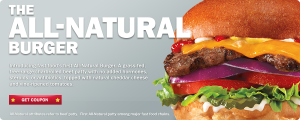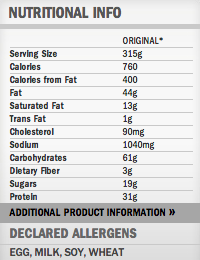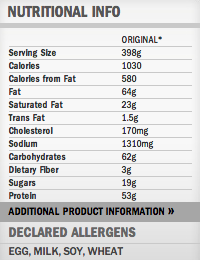If you live in an area with Carl’s Jr. fast food restaurants – predominantly the Western and Southwestern U.S. (with recent expansions to other countries) – you may have seen commercials for their newest menu item, The All-Natural Burger. Advertised as “fast food’s first All-Natural Burger,” it’s described as a “grass-fed, free-range charbroiled beef patty with no added hormones, steroids, or antibiotics, topped with natural cheddar cheese and vine-ripened tomatoes”.

The ads I’ve seen so far aren’t in their usual style for burgers. Their other burger commercials typically either show model type women eating food in a suggestive manner, or men eating a heavy meal in a way that makes them seem like a champ or somehow more “masculine”. In contrast, one commercial for the new burger includes an introduction from television talk show host and promoter of complementary and alternative medicine, Dr. Oz. The TV ad that is shown more frequently presents the burger as a healthy and delicious new option.
https://www.youtube.com/watch?v=pjLme3pTEQk
According to a recent article from Huffington Post, this burger is meant to appeal to Millennials.
“We’ve seen a growing demand for ‘cleaner,’ more natural food, particularly among millennials, and we’re proud to be the first major fast-food chain to offer an all-natural beef patty burger on our menu. Millennials include our target of ‘Young Hungry Guys’ and they are much more concerned about what goes into their bodies than previous generations,” Brad Haley, chief marketing officer for Carl’s Jr., said in a statement announcing the new burger.
Let’s take a look at this burger from a human health perspective:
The “no hormones” and “no steroids” part of the marketing is likely meant to appeal to those who believe that steroidal hormones given to animals will end up being consumed by humans and have a harmful effect on our health. Per the FDA, the fear is unfounded:
Some of the approved drugs are synthetic versions of the natural hormones, such as trenbolone acetate and zeranol. Just like the natural hormone implants, before FDA approved these drugs, FDA required information and/or toxicological testing in laboratory animals to determine safe levels in the animal products that we eat (edible tissues). Furthermore, FDA required that the manufacturers demonstrate that the amount of hormone left in each edible tissue after treatment is below the appropriate safe level. As described above, a safe level is a level which would be expected to have no harmful effect in humans.
As for antibiotics given to livestock, there has been concern about the misuse and overuse of antibiotics given, which may indeed pose health concerns for humans. However, the CDC and FDA do not recommend outright stopping the use of antibiotics in animals, but rather ending its use in unneeded circumstances. Antibiotics still provide great benefit when used properly and are sometimes necessary in treating animals.
CDC supports the strategy of the U.S. Food and Drug Administration (FDA) to promote the judicious use of antibiotics that are important in treating humans.
This strategy recommends that such antibiotics should be used in food-producing animals only under veterinary oversight and only to address animal health needs, not to promote growth.
The cows used in these burgers are listed as being grass fed. There are those who simply love the taste of grass-fed burgers and will still prefer it, regardless of health benefits or risks. But, as for the potential health benefits, it’s claimed that it contains more omega-3 fatty acids, less fat, more antioxidants, and more conjugated linoleic acid. Per the Mayo Clinic:
Lean beef that’s 10 percent fat or less — whether it’s grass-fed beef or another type of beef — can be part of a heart-healthy diet. Although many people think grass-fed beef tastes better, it’s generally more expensive and there is limited long-term research to definitively prove that grass-fed beef is better for you.
There are claims that grass-fed beef might contain fewer calories. But let’s look at the overall caloric content of these new burgers. The Single All-Natural Burger has 760 calories, while the Double All-Natural Burger is 1030 calories. The nutrition information was not available on their online pdf at the time of posting, but the information can be found on the nutritional calculator feature on their website. The most similar burgers they offer that aren’t “all natural” are the Famous Star with Cheese and the Super Star with Cheese, which have somewhat similar caloric content based on weight. If ordered without the special sauce or mayonnaise, the overall calories will be reduced. If caloric content is of concern, there are other options to consider, such as their turkey burgers. (Note: Calories alone don’t determine the health value of a particular food, but is often used as a primary measure in weight loss and maintenance.)
As for the natural cheese, it’s hard to discuss that as the word “natural” is a vague description that could be associated with numerous different descriptions. Vine-ripened tomatoes are commonly taste preferred, but a number of factors can affect the nutritional content of tomatoes.
For all the health aspects I am mentioning, I am referring to its effects on humans. There are debates as to whether or not certain techniques used are less ethical for the quality of the animals’ lives, which is another discussion entirely. However, the burger is primarily marketed to those who want to eat more “clean” and healthy, not necessarily those who are looking for an ethical meal, so my focus here is on potential human health benefits.
The new All-Natural Burger can be a good option for those with certain taste preferences, but doesn’t seem to offer any major health benefits over the restaurant’s other foods. The burgers still have the drawbacks of fast food, such as high sodium content, with only some possible minor benefits. It’ll be interesting to see if this becomes popular for the burger drive-through industry. On one hand, there are many people who will be attracted to the buzzwords in the ads and won’t care what the evidence actually shows. But many of the alternative health mindset will still be against anything from a fast food chain. Perhaps this will be an option for people who live in areas with few health food stores and related restaurants or for people on-the-go and traveling who order this as a “lesser evil”. The burger is marketed as a breakthrough for fast food and I feel that it’s implied they believe that other chains may follow their lead. Only time will tell if that comes true and I’ll be interested in seeing the outcome of how popular this becomes, for better or worse.


